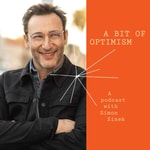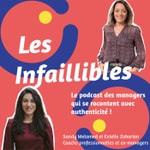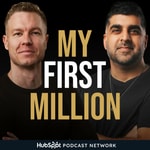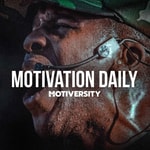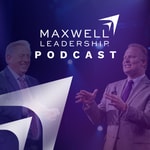Happy Space Podcast with Clare Kumar – Details, episodes & analysis
Podcast details
Technical and general information from the podcast's RSS feed.

Happy Space Podcast with Clare Kumar
Clare Kumar
Frequency: 1 episode/17d. Total Eps: 71

Recent rankings
Latest chart positions across Apple Podcasts and Spotify rankings.
Apple Podcasts
🇬🇧 Great Britain - management
18/07/2025#60🇨🇦 Canada - management
17/07/2025#50🇨🇦 Canada - management
13/07/2025#82🇨🇦 Canada - management
12/07/2025#57🇫🇷 France - management
06/07/2025#97🇫🇷 France - management
05/07/2025#87🇨🇦 Canada - management
05/12/2024#54🇨🇦 Canada - management
04/12/2024#42🇨🇦 Canada - management
03/12/2024#32🇨🇦 Canada - management
07/09/2024#81
Spotify
No recent rankings available
Shared links between episodes and podcasts
Links found in episode descriptions and other podcasts that share them.
See all- https://brenebrown.com/
436 shares
- https://www.shrm.org/
271 shares
- https://self-compassion.org/
242 shares
RSS feed quality and score
Technical evaluation of the podcast's RSS feed quality and structure.
See allScore global : 73%
Publication history
Monthly episode publishing history over the past years.
The Sunflower - Inviting Acessibility Around the World - with Paul White
Episode 54
mardi 27 août 2024 • Duration 40:38
CEO of Hidden Disabilities Sunflower, Paul White shares his journey so far in forming a global symbol for those with hidden disabilities.
CEO of the Hidden Disabilities Sunflower, Paul White shares the origin and growth of the Sunflower initiative, which started in 2016 at Gatwick Airport to support people with non-visible disabilities. Paul shares how the Sunflower lanyard has helped individuals, including a mother traveling with her son and a man with dementia who regained his independence. The conversation delves into why the program operates as a for-profit business, supporting inclusion and accessibility worldwide, and the impact it makes on both customers and employees. He also touches on the importance of creating sunflower-friendly environments and the cultural nuances of implementing the program globally.
BIO
CEO, Paul White, is a passionate and dedicated advocate for disability rights, driving real change as the global CEO of the Hidden Disabilities Sunflower. With an unwavering commitment to inclusivity, accessibility and championing equal opportunities for individuals with disabilities, Paul has a genuine desire to ensure that the wearers of the Sunflower receive the patience, care and understanding they may need throughout their day from whoever they meet, wherever they may travel.
CHAPTERS
00:06:34 Origins of The Sunflower
00:12:40 Is The Sunflower a charity organisation, why or why not?
00:17:27 The Sunflower and Pride
00:19:15 How The Sunflower can help employees
00:23:15 How corporations can use The Sunflower in the workplace
00:25:24 Language and Hidden Disabilities
00:31:02 Sunflower-friendly environments around the world
00:35:00 How companies can become allies of hidden disabilities + the purple pound
00:41:33 Where to find out more about Hidden Disabilities Sunflower
LINKS
Hidden Disabilities Sunflower Website
European Pride Organization Association
European Pride Organisers Association
Ep. 27 - The Undeniable Value of Neurodiversity - with Theo Smith
Ep. 44 - The Need for Clear Language around Neurodiversity - with Judy Singer
Ep. 49 - The Language of Neurodiversity - with Pasha Marlowe
IMAGE CREDITS (see images on Youtube video)
Gatwick Airport - Wiki
The Purple Pound logo - This is Me Agency
Sunflower logo - HDSunflower.com
Suflower lanyards - HDSunflower.com
Sunflower...
The Unexpected Power of Color - with Laura Guido-Clark
Episode 53
mardi 13 août 2024 • Duration 56:29
Color Expert, Laura Guido-Clark discusses the transformative power of color in design and the emotional and physiological impacts of color in communities and workspaces.
Designer and color expert, Laura Guido-Clark talks about the transformative power of color in design. She discusses how color acts as a conduit for human connection, its physiological impacts, and the influence it has on mood and productivity. Laura shares insights from her work with renowned organizations and her nonprofit, Project Color Corps, which uses color to bring hope and joy to underprivileged school communities. The conversation also covers practical advice for incorporating color into workspaces and the importance of creating environments that respect and nurture human needs.
BIO
Laura Guido-Clark is the world’s foremost color expert, Laura Guido-Clark – their color, materials, and finish. Throughout her twenty-plus year career, Laura has analyzed the conscious and unconscious influences that drive buying decisions. She has been dubbed an 'Experience Consultant' because of her ability to translate those influences into prescient forecasting and concrete applications of color and finish for new products.
In 2017, Laura launched her groundbreaking color methodology called LOVE GOOD COLOR. LOVE GOOD COLOR integrates science and the senses, enabling designers to factor in emotive response when using color. It is a language-based system that facilitates selection confidence and efficacy while simplifying and reducing iterations. The digital tool is currently in development. LOVE GOOD COLOR has been used by designers from various firms including Gensler, IA, Adobe, Rockwell Group, Atlassian, and Studio O+A.
Laura has helped companies such as Herman Miller, HP, Samsung, and Toyota use color and materials on their products that resonate with consumers and succeed in competitive markets. Her textile and pattern design includes work for HBF, Pallas, Carnegie, and FLOR. Laura’s expertise ranges from textiles to consumer products such as automotive, electronics, and major household appliances. Learn more about Laura’s design work at Laura Guido-Clark Design.
In 2011, Laura founded Project Color Corps™, a nonprofit organization dedicated to painting urban neighborhoods with color and pattern that impart positive messages of optimism and hope. The organization is now flourishing in four cities across the country.
Laura was honored as the IIDA Northern California Chapter recipient of the 2014 Leadership Award of Excellence. As a result of her expertise, Laura speaks both nationally and internationally on design and the creative process and was an expert design blogger for Fast Company.
CHAPTERS
05:40 Why color is so important in design
08:50 The effect of color on physiology and mood
10:45 Colors in schools
13:51 Punitive colors and the humanity of color
16:04 Project Color Corps and transforming underprivileged schools
21:50 Students’ reactions and impact
23:49 Transforming “grown up” spaces with color
26:30 How leaders can interact with color
31:55 Color dosage and why do certain colors look better on us than others
38:18 The relationship between light and color
43:00 How to achieve a sense of belonging through color
44:50 Bringing personality back to retail environments and logos
48:35 Designing to contrasting preferences
51:39 The importance of programming and Adobe Founders Tower
LINKS
The Need for Clear Language Around Neurodiversity - with Judy Singer
Episode 44
lundi 8 avril 2024 • Duration 54:52
Judy Singer, sociologist and pioneer of the neurodiversity movement discusses the role of language around neurodiverse populations, her views on autism, whether HSP’s fit into the neurodivergent ecosystem, and her feelings about the use of the term “woman” when considering transgendered individuals.
Judy Singer, sociologist and pioneer of the neurodiversity movement, discusses her views on the complexities of language, identity, and the nuances of social change. Singer discusses her contributions to societal dialogue on neurodiversity and her ongoing efforts in academic and public spheres, amidst navigating online controversy. Singer shares her pioneering thoughts on neurodiversity, the critical role of language, and naming in transgender identities. She gives her opinion on autism, and whether HSPs can be considered neurodivergent. The discussion also goes into Judy’s experience living in Sydney, and her future plans aimed at fostering inclusivity.
Judy Singer is an Australian sociologist credited with coining the term “Neurodiversity” in 1997-8 while completing an Honours Thesis at the University of Technology, Sydney. Her thesis, subtitled “a personal exploration of a new social movement based on “neurological diversity”, was the first non- psychomedical academic work to map out what was proving to be the last great civil rights movement to emerge from the 20th century. The movement was based on the pioneering work of the Autistic Self-Advocacy Movement, which was being joined by other neurological minorities who clearly needed a catchy, authoritative banner term
The idea grew out of her lived experience in middle of 3 generations of women whom she then described as “somewhere on the autistic spectrum”.
Like many people “on the spectrum” and especially as a woman seeking work in the early 1970s, Judy experienced difficulty finding employment. Fortunately, like many autistics, she was able to find a career in the burgeoning new field of IT which opened up a new world of opportunities for women.
When Judy became a parent with a child who appeared to have a “mysterious” disability, her career responsibilities compelled her to give up her career. Instead she went back to University to pursue her true interests: anthropology and sociology.
Judy has a long career in community organizing: she was the founder, via the internet, of the world's first support group for people raised by autistic parents, became the secretary of Sydney’s largest support group for the parents of autistic children and a co-founder of Sydney’s only independent social club for teenagers on the spectrum. She was elected a director of Shelter NSW, Australia’s peak body for housing justice but since the rediscovery of her work in 2017, she has been fully occupied with advocacy within the Neurodiversity discourse.
Note: Edited on May 1, 2024 to remove challenging language about mental health.
CHAPTERS
5:53 Judy's thesis and academic background
10:22 The importance of naming
12:10 Neurological diversity to neurodiversity
16:33 I do claim crediting the buzzword neurodiversity
24:03 Neurodiversity is a property of a place, not a person
26:33. Nature is not benign
27:48 What about those who don't care about being so particular about language?
29:47 Where does the trait of high sensitivity fit in?
31:50 Why do we need all these labels? The welfare system and the medical model of disability
38:41 The expansion of autism
43:32 Labels can lead to solidarity
44:12 Faking depression to get help
53:33 The importance of naming yourself
LINKS
Workplace Culture Dos and Don’ts - with Chris Dyer
Episode 43
mardi 26 mars 2024 • Duration 51:26
Company culture expert, Chris Dyer discusses his experimental approach to creating environments for better work culture, the pitfalls of AI, and suggests dumping the “one on one.”
In this episode of the Happy Space Podcast, company culture expert and author, Chris Dyer talks about different ways leaders can think about company culture and shares his experimental approach in creating better work environments. Chris gives his take on optimizing the hiring process where leaders aim to be fair vs. equitable, and even suggests dumping the weekly “one on one”. He gives insight into whether some leaders have realistic goals or not, and the tendency for some companies to continually “push” too hard after the pandemic. Other highlights include the irreplaceable value of human creativity and authenticity amidst limitations of AI in replicating human nuances such as humor, inclusivity, and emotional connection.
Chris Dyer is a recognized company culture and remote work expert. As a former CEO managing thousands of people, his companies were consistently named the best places to work. They have also been named a fastest growing company by Inc Magazine 5 times. Chris routinely consults and speaks, and Inc Magazine ranked him as the #1 Leadership Speaker on Culture.
He has three bestselling books: The Power of Company Culture and Remote Work, and has been named #5 on the Leadershum Power List, a Top 50 Voice in Leadership, a Top 40 Change Management Guru, a Top 50 Global Thought Leader, and a Top 50 leadership podcast, Top 50 HR Leaders Shaping the Future of Work, and a Top 101 Global Employee Engagement & Experience Influencers by Inspiring Workplaces and Work Buzz, just this year.
As a keynote speaker his goal is to inspire audiences with a straightforward delivery, insightful candor, and engaging humor. His talks leave audiences permanently transformed, offering innovative perspectives on leadership to improve company culture, and empower organizations to discover new successes. Countless companies have unlocked productivity, performance, and profits by implementing his 7 Pillar Strategy.
CHAPTERS
00:04:11 How should we be working post-pandemic?
00:05:56 The pitfalls of AI
00:08:21 How will AI affect the quality of work?
00:10:06 Are organizations still pushing too hard post-pandemic?
00:13:38 Chris’ strategy for better work during the pandemic
00:18:16 Fairness vs. equity at work
00:20:20 Chris’ example - military spouses
00:25:00 Bad leaders vs. good leaders
00:28:00 What to do if you’re stuck in a difficult work situation
00:32:10 Why listening is so important in company culture
00:41:35 Shifting from individual therapy to group therapy
00:47:12 Chris’ view on patience in the workplace
00:51:20 Chris’ experimental approach to innovation
LINKS
Empathy Is an Edge If You Know How to Use It - with Maria Ross
Episode 42
mardi 12 mars 2024 • Duration 47:46
Author and empathy advocate, Maria Ross busts myths about empathy and clearly defines what it is so that it can be effectively harnessed.
In this episode of the Happy Space podcast, Maria Ross, an author and empathy advocate, shares her life-changing experience of surviving a medical trauma, highlighting the role of empathy in her recovery and its influence on her work. Maria discusses her books 'The Empathy Edge' and the soon to be released in fall 2024, 'The Empathy Dilemma,' emphasizing the operationalization of empathy in organizations and its importance in leadership. The conversation touches on common myths about empathy, its innate nature, and methods to cultivate it in business environments and personal lives. Maria and Clare explore the misconceptions surrounding empathy and sensitivity, advocating for a cultural shift towards more human-centered practices in business and personal spheres.
Maria Ross is a speaker, facilitator, author, and empathy advocate who believes cash flow, creativity, and compassion are not mutually exclusive. She’s spent decades helping forward-thinking leaders and teams connect and engage through empathy to accelerate growth and impact. Maria has authored multiple books, including her most recent title, “The Empathy Edge: Harnessing the Value of Compassion as an Engine for Success” and also hosts The Empathy Edge podcast.
Maria understands the power of empathy on both brand and personal levels: in 2008, shortly after launching her business, she suffered a ruptured brain aneurysm that almost killed her and inspired her memoir, “Rebooting My Brain”. In it, she explores the critical importance of empathy in healing and overcoming adversity. Her next book “The Empathy Dilemma: How Successful Leaders Balance Performance, People, and Personal Boundaries”, arrives on shelves in Fall 2024.
CHAPTERS
03:06 The medical emergency that started Maria’s journey
07:38 Operationalizing empathy in organizations
12:17 Busting empathy myths part 1
17:31 The connection between empathy and highly sensitivity people
21:00 Toning your empathy muscle
24:04 Busting empathy myths part 2
26:51 “Empathy circles” and having powerful conversations
30:26 Empathy and gender in leadership
36:28 Having better experiences surrounding layoffs
39:55 Empathy in personal relationships
LINKS
For active links, visit www.clarekumar.com/podcast
The Empathy Edge: Harnessing the Value of Compassion as an Engine for Success by Maria Ross
The Empathy Dilemma: How Successful Leaders Balance Performance, People, and Personal Boundaries by Maria Ross
Rebooting My Brain: How a Freak Aneurysm Reframed My Life by Maria Ross
“The Empathy Edge” Podcast
TedX Talk: How to Trojan Horse Leaders into Being More Empathetic | Maria Ross
Talks at Google: Rebooting my Brain | Maria Ross
Clare’s HSP Quiz
Empathy Circles Website
Institute for Patient and Family-Centered Care
Awakening Compassion at Work
Phil M. Jones
Exactly What to Say: The Magic Words for Influence and Impact by Phil M. Jones
IMAGE CREDITS
The Empathy Edge book - Maria Ross
The Empathy Dilemma book - Maria Ross
The Empathy Edge Podcast logo - Maria Ross
Mark Cuban - Wikipedia
Empathy Circles logo - Edwin Rutsch
Empathy Circles tents - Edwin Rutsch
Phil M. Jone - philmjones.com
Exactly What to Say book - goodreads.com
Satya Nadella - Wikipedia
Other images - Canva
Learn more about and follow Maria:
Youtube
😀😃😄😁😆
Highly sensitive executive coach and productivity catalyst, Clare Kumar, explores the intersection of productivity and inclusivity continually asking how can we invite the richest contribution from all. She coaches individuals in...
How DEI Efforts Must Change to Have Maximum Impact - with Seramount’s Katie Mooney
Episode 41
mardi 27 février 2024 • Duration 39:31
We need to weld DEI into the business, embedding DEI in every relevant aspect that we can. When you think about welding something into the business, it's an incredibly powerful word because you think of welding as kind of these two pieces, the merging or fusion of these two pieces coming together.
You’re listening to episode 41 of the Happy Space podcast. Today we’re exploring keeping DEI initiatives strong in challenging times by welding them to your business - with Seramount’s Managing Director Katie Mooney.
Seramount's Managing Director, Katie Mooney, discusses how she began her DEI journey, her view on "welding" DEI initiatives to organizations, the value of community, and what it means to “pass the baton” as a DEI practitioner.
Managing Director of Seramount, Katie Mooney talks about the importance of sustaining efforts for Diversity, Equity, and Inclusion (DEI) in the workplace. She shares her journey from a young professional in financial services to becoming deeply involved in DEI work, sparked by a visit to an exhibit called “Struggle for Justice,” as part of Smithsonian’s National Portrait Gallery. She also prefers the term “welding” DEI to organizations as opposed to embedding it and shares practical ways of doing so. With the downturn of the economy and a concerted effort by some to dismantle DEI efforts, these are volatile times, and keeping DEI strong is more important than ever. Katie emphasizes that slow progress is not an option due to the demand for transparency and the need for proactive processes. As DEI practitioners, carrying the baton forward is necessary. I hope you enjoy this illuminating discussion about DEI and where it’s heading next.
Katie Oertli Mooney is a Managing Director at Seramount, an organization with over 40 years of experience supporting and advancing women in the workplace. She is an accomplished DEI leader and thought partner with expertise in driving strategy and growth of diversity and inclusion change management, planning and programs. Prior to joining Seramount, she was responsible for overseeing the client delivery, staffing, operations and growth as Vice President of Jennifer Brown Consulting. She was accountable for the firm’s successful consulting project delivery to clients from the Fortune 1000, government agencies, startups, to nonprofits.
Before that, she managed the DEI enterprise learning and development strategy at Capital One specializing in differential investment programming to support historically underrepresented talent and communities of color. She is currently on the Board of Directors for the GSBA; the largest LGBTQ and allied chamber of commerce in North America and is supporting the organization in 2020, by advancing diversity, equity, and inclusion for the Board of Directors, for the benefit of GSBA staff, members, partners, and the LGBTQ+ and allied community of Washington State. Katie has a Master’s degree in Human Resource Management with a concentration on Diversity and Inclusion Management from Georgetown University. She is based in Seattle, WA.
CHAPTERS
02:34 Katie Mooney: A DEI practitioner's journey
03:52 The importance of DEI in business strategy
08:00 The power of DEI in driving business outcomes
12:50 Challenges and opportunities in DEI work
15:18 The role of research in DEI work
15:57 Welding DEI into business outcomes
26:44 The impact of DEI on consumer behavior and attracting talent
29:29 The role of DEI in navigating through polarity
36:44 Future of DEI work
LINKS
Remote Working 2.0: Won’t You Be My Neighbor? - with Radious’ Amina Moreau
Episode 40
mardi 13 février 2024 • Duration 42:50
The other thing that I keep harping on is that remote work doesn't need to mean that it's lonely work. We confuse remote work with isolation a lot because we equate remote work with working from home. Again, because the pandemic forced remote work to be synonymous with working from home. But post-pandemic, there are countless ways to work remotely.
You are listening to episode 40 of the Happy Space Podcast. Today we're exploring remote work 2.0, and the opportunity to work at your neighbors with Radious founder, Amina Moreau.
Amina Moreau’s startup Radious addresses the challenges of returning to the office by solving for the dreaded commute and providing a network of distributed workspaces in local neighborhoods.
Amina Moreau shares the history of Radious, a company focused on creating a network of distributed workspaces in local communities. The idea originated during the 2020 pandemic lockdowns, where the shift to remote work prompted discussions on the challenges of returning to the office, especially with the commute being a significant barrier. Radious aims to provide flexible and cost-effective solutions by offering a network of workspaces in suburban areas, allowing employees to choose locations based on their needs and preferences. The focus is on reducing commute times, fostering collaboration, and providing diverse workspace options for different activities. Amina encourages a nuanced approach to flexible work solutions, tailored to factors such as culture, innovation, and productivity. She highlights the significance of leveraging data and insights to inform workspace decisions and stresses the importance of robust self-reflection.
A chronic entrepreneur, Amina's companies are merely symptoms of her obsession with putting something meaningful out into the world. Amina began her career as co-founder and Executive Creative Director at Stillmotion, Inc., a five-time Emmy Award-winning band of filmmakers.
Amina became an Adjunct Professor at the University of Oregon's School of Journalism and Communication in 2018, teaching graduate students about the business of storytelling. Radious is her next big thing, an online platform that outfits residential properties with workplace amenities and offers them up for company workdays and team meetings —rented by the day. When she’s not busy building Radious, you’ll find her grunting on the tennis court.
Recently ranked #1 in the Pacific Northwest, she continues to play at a high level and finds her sense of peace crushing it at 100 MPH.
CHAPTERS
01:44 Radious’ different approach to remote work
04:21 The philosophy and benefits of working locally
07:31 The impact of the commute on work & concern for the environment
17:12 Understanding the diversity of work needs and preferences
18:49 The importance of data and self-reflection in remote work
23:03 Adapting to new workforce demands
24:36 The impact of remote work on personal life
25:37 Addressing loneliness in the digital age
26:40 Remote work doesn’t have to mean lonely work
31:08 The role of community in remote work
35:55 The evolution of workspace design
40:29 The importance of collaboration and transparency in workplace policies
42:30 The future of workspaces
LINKS
Why We Need Atypical Neurodivergent Leaders - with Rick Brennan
Episode 39
mardi 30 janvier 2024 • Duration 40:12
Rick Brennan, author of “The Atypical Leader”, and champion for the undiagnosed neurodivergent professional shares the secrets of his success in the corporate world, why it’s important to have neurodiversity in the workplace, and how investing in human connection can build your foundation as a leader.
Rick Brennan, author of 'The Atypical Leader', shares his journey from being someone unaware of his neurodivergent temperament to recognizing it as a strength in the corporate world. Rick shares how he built relationships and the critical need for a foundation of trust. He believes we need to look beyond diagnosed conditions and to value the “undiagnosed”. Rick explains how leader-employee interactions can be more “real,” and how fun and hardwork can co-exist together, making for the most inclusive team environments.
Rick Brennan is a retired executive, leadership consultant, author and podcaster whose battle with learning disabilities, anxiety and a host of other neurodivergent conditions leads him to a developing unique perspective and way of doing business.
Following academic struggles in his early years, Rick began to uncover skills emerging from within the very limitations that he was told would be his demise, skills that would ultimately shape his success.
He spent 35 years occupying top executive positions in the Canadian healthcare and pharmacy industry and at one time was responsible for up to 4.5 billion in annual sales across 2500 pharmacies.
Rick is recognized as an outstanding leader, possessing an out-of-the-box management style and an expert team builder. By the end of his corporate career Rick’s teams would secure some of the highest employee engagement scores in the world.
CHAPTERS
00:02:01 The journey of an “Atypical Leader”
00:04:04 Understanding neurodiversity and rick’s diagnosis
00:08:38 Trust and empathy in leadership
00:13:19 The importance of neurodiversity in the workplace
00:19:58 How to build trust in team environments
00:22:49 Adapting to remote work
00:26:25 Why humility is important in leadership
00:30:50 The challenge of building relationships remotely
00:32:24 Why “Done is Better than Perfect”
00:37:10 How fun and hardwork can coexist at work
00:39:07 Using your intuition and the power of human connection in leadership
LINKS
IMAGE CREDITS
Rick Brennan Headshot - Rick Brennan
Atypical Leader book - Rick Brennan
Cardboard pop hat - Canva
Photobomb graphics - Canva
Man at desk, stressed - Canva
Man standing up, stressed - Canva
Girl working from home - Canva
Checklist - Canva
Woman stressed at desk - Canva
Man, plaid shit - Canva
Woman, yellow sweater - Canva
Woman covering ears - Canva
Boat paddling down river - Canva
Working at cubicles - Canva
College checklist - Canva
Man in front of Ivy League school - Canva
Graduates facing forward - Canva
Man smiling in group - Canva
Coworkers meeting - Canva
Sad to happy face - Canva
Negative to positive - Canva
Workers in a group, busy - Canva
Workers around a table, busy - Canva
Man realizing his greatness - Canva
Empowered woman, speaking in front of group - Canva
Bridge, panning - CAnva
Leader speaking to group - Canva
Business partners out to lunch - Canva
Group working 1 - Canva
Group working 2 - Canva
Key note speaker - Canva
Man sitting on the floor - Canva
Learn more about and follow Rick:
Research Insights: What the Data is Actually Saying about Remote Work - with Kate Lister
Episode 38
mardi 16 janvier 2024 • Duration 39:29
Global Workplace Analytics’ Kate Lister shares her insights on the growth of remote work, the challenges leaders face with the abstract nature of managing virtual teams, and why using data-driven research is important instead of relying on gut-based decision-making at work.
You're listening to episode 38 of the Happy Space Podcast. Today I speak with Kate Lister, founder of Global Workplace Analytics. You'll enjoy her candid take on the future of work.
Kate Lister, president of Global Workplace Analytics, discusses the shift towards remote work and how organizations have been reacting. Kate shares her insights about the importance of moving from gut-based decisions to research-driven strategies and how remote work dramatically increased because of the pandemic. This conversation also highlights the significance of inclusive work practices for employers to retain their workforce. Kate says that it's an era of transformation for businesses, and leaders need to be more intentional, embrace transparency, and grasp the opportunities presented by the changing world of work.
Kate is a widely-recognized thought leader on workplace, workforce, technological, and other trends that are changing the who, what, when, where, and how of work.
She has been helping public and private sector employers optimize their remote, hybrid, and flexible work strategies for nearly two decades.
Kate’s recent client work includes the development and roll-out of hybrid/remote workplace and return-to-office strategies for a global law firm, an automotive industry giant, a regional insurance company, and a behemoth tech firm.
Kate produces a wide range of primary and secondary research and is a trusted source of insights about the future of work for news outlets including the New York Times, Washington Post, Wall Street Journal, Newsweek, and dozens of others. She has appeared on NPR, The Today Show, CNBC Nightly News, Voice of America, Fox News, and dozens of other TV and radio news programs.
As a resident of San Diego, Kate charges extra if she has to travel anywhere with temperatures over 75F or less than 65F, humidity greater than 75%, frequent rain, or bugs. She’s willing to make exceptions for Hawaii and New Zealand. She’s over-the-top nuts about dogs and gardening (as long as it’s not too hot out).
CHAPTERS
00:30 The shift towards remote work
04:15 Leaders tendency towards fear and control in remote work
07:49 The impact of the pandemic on remote work
14:27 How employees experience remote work
21:31 The reality of bias in leaders and the false consensus effect
26:02 #flexibilityisinclusivity and the risks of ignoring equity in remote work
31:24 The importance of data-driven research and avoiding gut decisions
34:27 The role of transparency and accountability in leadership
35:03 The future of distributed and remote work & where we need to go from here
LINKS
U.S. General Services Administration
IMAGE CREDITS
Kate Lister headshot - Kate Lister
Global Workplace Analytics logo - Global Workplace Analytics
Circling the Wagons - Canva
Tug of War - Canva
Press Rewind - Canva
Factory Workers - Canva
Shamrock graphic - Canva
Hybrid Work, group surrounding talking screen -...
Inclusive Design: Exploring Respite, Place Attachment & Hoteling - with Ryan Anderson
Episode 37
mardi 2 janvier 2024 • Duration 47:05
MillerKnoll’s Ryan Anderson shares his research and talks about the benefits of respite spaces, place attachment, recognizing your own belonging cues at work, and how being intentional about usable designs makes for the most beautiful workspaces.
You're listening to Episode 37 of the Happy Space Podcast. Today, I speak with MillerKnoll’s Global Research lead, Ryan Anderson, about opportunities for organizations to create more inclusive workspaces that support sustainable performance.
Ryan Anderson, VP of Global Research and Insights at MillerKnoll, shares his research, deep passion, and appreciation for inclusive design. Ryan suggests that we must dramatically rethink our workspaces in order to better reflect our biological, mental, and emotional needs at work. Ryan talks about the current need for “spaces for everyone”, including those who identify as neurodivergent. In addition, he discusses place attachment, the human tendency to form connections with physical spaces, and the challenges and limited opportunities offered by the practice of hoteling. The discussion underscores Clare’s often made point that if you design for wellbeing performance will flow.
Ryan Anderson serves as Vice President of Global Research and Insights at MillerKnoll, renowned workspace and furniture design company. Ryan’s team leads MillerKnoll’s research, shares insights publicly across the world, and provides workplace strategy and design services to MillerKnoll customers.
With nearly thirty years of industry experience, Ryan’s work has centered on how the places we inhabit can be better designed to support healthy, inclusive, and productive communities. Ryan hosts MillerKnoll’s “About Place” podcast on the future of the workplace and regularly speaks at public events about MillerKnoll’s historical and current research.
He is a member of the SHRM (Society for Human Resource Management) Executive Network, an Executive Fellow at Woxsen University in Hyderabad India, and has been featured in a wide variety of publications such as The Wall Street Journal, NPR, the BBC, Fortune, Bloomberg, and beyond.
CHAPTERS
00:00 Introduction
05:49 The role of belonging cues in inclusive design
11:28 The business case for inclusive design
19:24 The future of workspace design and commercial real estate
22:55 Respite spaces in the workspace
26:34 The impact of diversity and culture on workspace design
28:49 Sustainable productivity
30:40 The role of leadership in promoting wellbeing and preventing burnout
35:08 Hotelling and depersonalization of office space
40:27 The importance of team-based workplace design
42:13 The need for empathy in the workplace
LINKS
Harkin Institute for Public Policy
Work Better Save the Planet - Lisa Whited
IMAGE CREDITS
Ryan Anderson headshot - Ryan Anderson
MillerKnoll logo - MillerKnoll
Car Parked next to bike lanes - Clare Kumar
Nigel Oseland - UCL
Dr. Greg Wells - LinkedIn
Healthcare Recliner - HermanMiller
Harkin Institute of Public Policy - Harkin Institute
Bill Stumpf -

